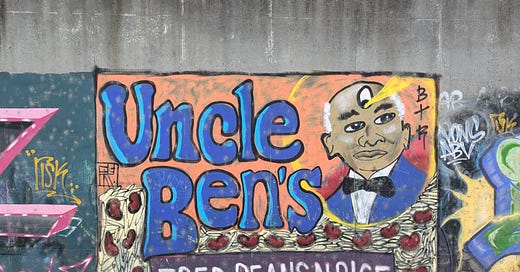It's Just How Politics Works
In Which: Official recordings are lost, Changes are suggested for the CSC, and Councilmember Goldstein says the quiet part out loud.
The Hayward Herald will be taking a break for the Autumn Holiday. Whether it’s Thanksgiving or ThangsTaken or some other kind of Harvest Celebration, spend time with people you care about and enjoy the bounties of the Earth.
November CSC Meeting
The November meeting of the Community Services Commission (CSC) turned out to be more interesting, and difficult to track, than the Agenda led us to believe. After confirming with City Staff, the recording of the November CSC meeting has either been lost, or was never properly recorded in the first place.
That means this report relies heavily on Staff Reports and interviews with individuals who attended. There’s a chance I missed something that may have been on the recording, but I tried to corroborate with multiple sources whenever possible.
The Funding Stuff
The two items on the Agenda with Staff Reports were about the Bidder’s Conference and the Consolidated Plan.
Bidder’s Conference
The Bidder’s Conference is where agencies looking for funding get a presentation from City Staff about the process they’ll have to complete. That meeting was also supposed to be recorded and suffered from a lost recording—hopefully not the beginning of a trend, though starting on October 16 the number of meeting recordings has plummeted.
The Conference was attended by 64 agencies this year. Many of them will be competing for the minimal General Funds allocated to Service Providers, which has seen flat funding even as need has increased over the last several years. The applications are due on December 3rd and the CSC will begin reviewing them on December 15th.
The CSC will conduct interviews on January 18th and January 25th, with some Commissioners being in interviews for up to 12 hours.
Consolidated Plan
The Consolidated Plan is where the CSC gets to recommend any changes to funding priorities. Right now the priorities are:
Public Facilities
Housing Programs
Public Services
Economic Development
These goals align with both the Federal Government’s Community Development Block Grant (CDBG) goals and the City of Hayward’s Strategic Plan. It’s unknown if any changes were recommended—it’s likely that they approved Staff’s recommendation to make no changes to the Plan.
However, one particular issue that the CSC may face going forward are changes to the Federal Goals for the CDBG funding—which comes from the Federal Department of Housing and Urban Development (HUD). Given the retaliatory nature of the Trump Administration, it’s possible that the goals of HUD may change or that the State of California may be targeted for explicit divestment.
In the next 4 years, anything could happen.
Ad Hoc Committee Debrief
The City Council convened an Ad Hoc Committee—consisting of Councilmembers Andrews, Roche, and Bonilla—to recommend changes to the Appointed Officials Handbook. The Handbook outlines the general behavior and responsibilities of all bodies appointed by the City Council—the Library Commission, Keep Hayward Clean and Green Task Force, etc. Members of City Council—including the Mayor—have made clear that this was specifically because of the CSC, though City Staff has taken pains to say otherwise.
Committee Recommendations
According to documents shown to the Hayward Herald, the draft recommendations of the Ad Hoc Committee included a lot of changes. Most of them clarified or made explicit expectations around the Commissioners and their Council Liaison with an focus on “decorum” and “respect.” But it also had big changes to the CSC.
Separation of Roles—The draft recommendations explicitly forbid members of Commissions from using their titles when advocating for anything outside of their Commission’s purview.
Example: Someone can’t say they’re on the Library Commission during public comment if they advocate for police reform
Limiting CSC to Funding Only—The draft recommendations change language around the CSC’s duties to put the focus specifically on the funding process. It also recommends reducing the number of meetings to coincide with the funding process, which mostly happens between November and March.
Limiting Chair to 1 Year Term—The draft also recommends limiting Chairs of all appointed bodies to 1 year terms, with the intent of spreading around leadership responsibility.
Reduced Membership—The draft recommended reducing membership of the CSC from 17 to 11 members.
So What Does This Mean?
If you were to ignore the context of the last two years, someone could argue that the changes are meant to reduce the burden on CSC members, make the funding allocation process easier, and generally make things more clear for other Commissions. But the context of these changes is worth revisiting.
After the uprising around the Movement for Black Lives, the CSC tried to look into and address a number of social justice issues, including Russell City and the Community Advisory Panel to the Chief of Police (CAP). While the Russell City initiatives were embraced by Council—including an official apology and action plan—the discussion around the CAP was less well-received.
Multiple members of City Council, including the Mayor and all three members of the Ad Hoc Committee, felt that the CSC had gone too far—“off the rails” as Councilmember Goldstein put it. Though City Staff, especially Assistant City Manager Regina Youngblood, took pains to frame the Ad Hoc Committee as a holistic process, there has always been an undertone of retaliation from City Council. “Let’s be real on why we’re even talking about this right now: it’s the Community Services Commission,” Mayor Salinas said in February, “It has gone awry and we really need to reel this back in.”
Discussion Time
There’s no way for the general public to know exactly what was said during the meeting without the official recording. However, after speaking with multiple members of the CSC, Councilmember Goldstein—speaking on behalf of the City Council—admitted that the Ad Hoc Committee was formed in retaliation against the CSC.
Commissioner Calvin Wong started the discussion by speaking against the idea of so-called “commission creep”, “I just want to do good work that helps uplift the working people of Hayward,” he said in notes shared with the Hayward Herald. Commissioner Wong said that it made no sense for the CSC, as an extension of the local government, to be pulled back for trying to do some good. He said that if people don’t trust the government, “[it’s] not because it does too much, its because they think it does too little.”
Commissioner Wong also supported the interpretation of the bylaws that justified additional action from the CSC. He even quoted a portion of the CSC orientation, which said the CSC should carry out its duties by “questioning everything and working to find innovative solutions for improving our work and the lives of our residents.” This interpretation has been framed by the City Council as overly-broad and beyond the intended scope of the body.
Afterward Commissioner Wong’s comments, Councilmember Goldstein responded with a “pretty forceful retort.” According to multiple members of the CSC, Councilmember Goldstein referred to the recommendations for the CAP as “demanding” and that the Council’s reaction of reigning in the CSC after being issued demands is “just how politics works.”
The Herald reached out to Councilmember Goldstein for comment, but he did not respond in time for publication.
Commissioner Lupe Angulo recalled comparing the situation to parents reprimanding a wayward child. “I said, ‘This is like if my daughter breaks the rules. I make them even more restrictive,’” she recalled. “He said, ‘Exactly.’ I said, ‘I didn’t sign up for a parent/child relationship.’” Commissioner Angulo also supported the expanded role of the CSC, “Community service isn’t just about a funding cycle for us,” she said.
Another Commissioner, who gave comment under the condition of anonymity, said “I would like the Commission to continue to have the the flexibility to bring issues to Council in the future.” This appeared to be the consensus among Commissioners who spoke. The only Commissioner who felt differently was, according to reports, Commissioner Mariana Triviso who said she joined solely to do the funding work.
Commissioners who spoke to the Hayward Herald recalled feeling surprised that Councilmember Goldstein would openly admit to retaliating against the CSC because of the CAP recommendations. The CSC has no official power beyond giving recommendations—even the funding process results in recommendations which the Council can choose to adopt, or not, as it chooses.
CSC Chair Austin Bruckner-Carrillo had taken pains to frame the discussion as a recommendation, especially after then-City Manager Kelly McAdoo publicly mischaracterized the request to meet with the CAP as a demand. The CSC doesn’t have authority to force the City Council to do anything.
What Does This Mean?
City Council has made a great show of asking for community input—from community office hours to calls for participation in focus groups to the appointed bodies themselves. All of these place Hayward residents in the position of supplicant. “Please, Council, will you do this?” we ask, and the City Council has the power to listen or not as they see fit—they’re The Deciders.
What these comments and draft recommendations demonstrate is a desire to hold onto and control power. A Commissioner is given a small amount of institutional power—Staff time and titles—by the City Council. These recommendations seek to ensure that the power is used the way Council wants it to be used.
The reason the CSC recommendations are being positioned as a “demand” is because it was not politically viable to disagree with them. They knew that the CAP was a problem they’d put off for too long. They knew that the CSC was protecting the vulnerable from police astroturfing. However their solution was not to bring the community in, but to maintain control.
Council didn’t like the power they had conferred on the CSC being used in a way they couldn’t control—that’s why they’re taking away titles in public comment. Rather than empower the community—giving them a direct hand in governing—the Council is trying to take power away. They seem to believe CSC can’t be trusted with it.
But the City Council works for us. The only reason they have power at all is because we allow them to have it. And over the next several years, that idea is going to be more important to hold onto than ever.
Only Council knows what they’ll do regarding the CSC, but their decision will show how they treat their power. Do we want a City Council that punishes people for trying to help their government, or one that encourages true resident participation? I know my answer; spend some time thinking about yours.







